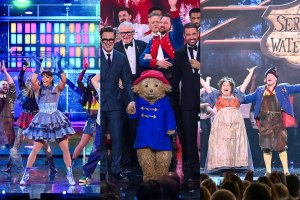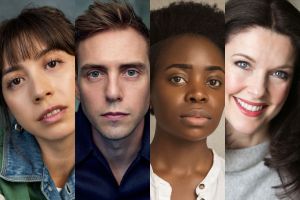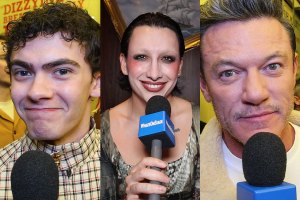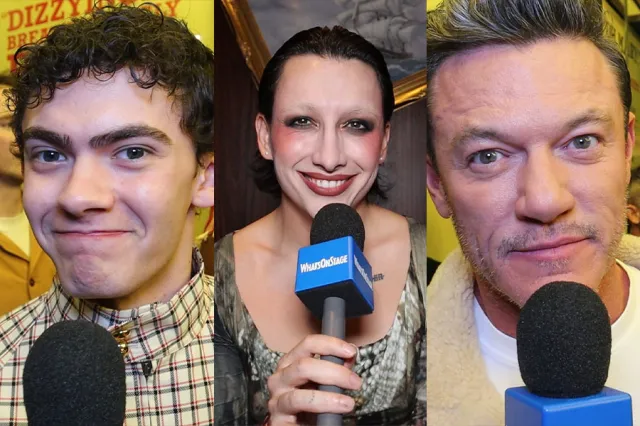20 Questions With… Eamonn Walker
Actor Eamonn Walker – who this week becomes the first black actor to play Othello at Shakespeare’s Globe – talks about following Sidney Poitier’s example, making history at Bankside & conquering Hollywood.
Eamonn Walker will become the first black actor to play Othello at Shakespeare’s Globe, when he opens the theatre’s Renaissance + Revolution season this week. American director Wilson Milam’s production of Othello marks the first time that the new Globe has staged Shakespeare’s tragedy and the first time that any Globe on the Bankside site has cast a black actor in the play’s title role.
Walker – who is best known for playing Kareem Said in the American HBO prison series Oz and as Luther Graves in Fox TV’s legal drama Justice – is joined by Blackadder and Spooks star Tim McInnerny as Iago and Zoe Tapper (last seen on stage opposite Joseph Fiennes in the 2005 West End revival of John Osborne’s Epitaph for George Dillon) as Desdemona. With designs by Dick Bird and music by Stephen Warbeck, the production employs Renaissance staging, costume and music.
Working mostly in America for the past seven years, Walker has appeared in numerous films and TV series including Young Soul Rebels, Duma, Lord of War, Once in a Life, Shopping, ER, Homicide: The Movie, The Governor, Supply and Demand, Oz and Justice.
Prior to that, he became nationally known in the UK as a regular in the 1980s BBC sitcom In Sickness and In Health. He played Othello, opposite Christopher Eccleston, in Andrew Davies’ contemporary ITV adaptation in 2001, and last year played Mark Antony, opposite Denzel Washington’s Brutus in Julius Caesar at New York’s Belasco Theatre.
Date & place of birth
Born 30 November 1959 in west London.
Lives now in
I have a home in London with my family and three children, but I’m away filming in Los Angeles so much that I spend a lot of my time living in hotels.
Training
I’m entirely self-taught. Throughout my life, I’ve been lucky in that certain people have taken me under their wing and taught me many things. The first was one of my schoolteachers, Mr Thorne. At the after school club, he introduced me to culture and the arts and encouraged my thirst for knowledge. He died long ago, but I wish he could see the little kid who used to wait outside the school gates for his mum now acting on stage at Shakespeare’s Globe. I’ve never stopped learning. That’s what’s so great about being an actor.
What made you first want to become an actor?
I was a kid sitting next to my mum at our home in Tufnell Park watching In the Heat of the Night on TV, with Sidney Poitier as Virgil Tibbs, the black detective helping to solve a murder in Mississippi. The famous scene in the greenhouse, when Rod Steiger’s racist police chief slaps Virgil in the face, went straight through the TV screen and into my heart. It was that amazing look in Poitier’s eyes that hit me. I just turned to my mum and said, “I want to do that”. I guess I was reacting to the sheer power of the acting. I remember the very next day walking into Hungerford School in Islington and all the racial stuff I used to take as the norm stopped happening. I was a different human being, but had no idea how to become an actor.
How did you go about it?
Mum was right behind my ambition and went straight out and got me a job as child model. I remember saying “No mum, that’s not what I meant.” In fact, between the ages of 17 and 23, I worked as a dancer and was part of a troupe called Explosives Dance Theatre Company, but acting was always the ambition. My first audition was an open audition at the Albany Empire for a musical called Labelled with Love. You had to sing, dance and act, so as I was working in a pub at the time, I learned the words to “Signifyin’ Monkey” by Oscar Brown Jr off the jukebox. I was total crap, but I persuaded them to see me in an Explosives Dance production, which I argued would be better than any audition. They came along, saw me and gave me a part.
First big break
That has to be In Sickness and In Health, my first television job in 1985, playing Winston, Alf Garnett’s black, gay home help. Suddenly I was working with the cream of the comedy crop. I thought, who needs drama school when you can learn so much from actors like Warren Mitchell and Dandy Nichols and a scriptwriter like Johnny Speight. It was a dream role. Alf was prejudiced and racist and used to call me “Marigold”, but the public knew that he was the ridiculous one. My character helped him mellow and become more accepting. It was a great comic statement about people getting just along together.
How was it for black actors when you were starting compared to today?
It’s a completely different world today. Early on I was involved with a theatre company called Flipside above the Kensington Park pub in Ladbroke Grove where we took on roles and plays that we wouldn’t normally get. I remember being in a production of Danny and the Deep Blue Sea. When I first went out to Los Angeles ten years ago, people would be thinking, “British? Black? Hollywood? No way! It just doesn’t happen”. Now a lot of talented black British actors are working out there, perhaps because there’s not enough of the right type of work here. It’s become somewhere else for us to go to ply our trade, but not just as “black” actors. Still only a small percentage of actors are non-white. And perceptions need to change, because we are diverse and have a lot more to offer than we are often allowed to give, especially in movies.
What’s your favourite role to date?
Kareem Said, the Muslim prisoner in Oz. As an actor, I like to be in productions that are not frightened to push the envelope. Oz did that, whether it was dealing with religion, sexuality or crime. As far as I’m concerned, the series broke the mould on American TV. Because it was an HBO series, you had to buy it so it wasn’t on primetime and could cover all sorts of taboo things that are normally only caught in movies. Series like The Sopranos came after and they all took bits of Oz.
What roles would you still like to play?
There are two. Because I am perverse, I’d now love to play Iago. Maybe I could swap with Tim McInnerny one night! I wouldn’t mind a crack at Lear as well. Not yet though.
What’s the best advice you’ve ever received?
That came from the actor Norman Beaton. I tended to beat myself up in rehearsals and he once said, “Eamonn, just do it”. Now that’s what I tell myself whenever I’m getting into a state about a role or how to say a certain line.
What might you have done professionally if you hadn’t become an actor?
I did some social work early on for a while, so I’d probably end up working with kids.
What’s the last thing you saw on stage that you really enjoyed?
Laurence Fishburne and Angela Bassett in a brilliant production of August Wilson‘s Fences at the Pasadena Playhouse. Laurence gave a tour-de-force performance. A few years ago we did a film together called Once in a Life, which he also directed, so he’s become like a brother. That’s the most amazing thing I’ve seen on stage for years.
Do you see prefer working on stage, TV or film?
I like it the way it is. No one can put me in a box at the moment. Film, TV, stage or radio, it doesn’t matter. What matters are good scripts, good actors and good directors.
Why did you want to accept the title role in this production of Othello?
It’s always been an ambition. For any actor of colour, Othello is the pinnacle. I’ve been approached several times in the past and turned it down because I knew I was too young to fully grasp the nuances of Shakespeare’s language and the umbrella of topics he’s handling in the play, covering love, jealousy, passion, race, ambition and cultural differences. Now that I’m in my forties, I guess I’m better equipped as an actor, both technically and emotionally.
You’ve already played Othello in a TV adaptation. How was that?
I always said that when I did finally get to play the role, I wanted it to be different and I wanted it to be special. To be the first black actor to play the role at Shakespeare’s Globe is very special. The modernised TV version I was in a few years ago was certainly different. Instead of being about a Moorish general lured into murderous jealousy by Iago, Andrew Davies set the story in New Scotland Yard where I was the first black head of the Metropolitan Police, John Othello, and Christopher Eccleston was Ben Jago, his deputy. After that, I knew I would eventually meet the real Othello on stage; but because I spend so much of my time working on TV and films in the States these days, it was a matter of where and when.
You’re making history as the first Othello at the Globe played by a black actor. Is that a pressure?
There is some pressure. In Sidney Poitier’s autobiography he describes how, as a black actor, you are always aware that you’re being watched and there is a responsibility that comes with being under that watchful eye. I know it’s an important time in history where cultures are merging, but all I can do is the best possible job as an actor. I’m just working my backside off with the Globe team to give the audience the best Othello they’ve ever seen. Scared as I am sometimes, it brings out the tenacity and fight in me.
How do you feel about the historical tradition of white actors blacking up to play Othello?
That’s how it was. There’s nothing we can do about it now. People accepted it as the norm, they accepted a lot of things then that weren’t necessarily right. We’ve all moved forward and today Britain is a true multicultural society, which is a great strength. For black actors there is nothing we cannot do now, except we just need to be able to see it. But Othello is not about colour and the Moor’s “sooty face”. Desdemona and Othello see each other as people.
Is Othello a play for today?
It’s not a big leap to make an attachment with your own life. There are no big theories involved in this production. We’re talking about everyday feelings involving love, mistrust, deception, and jealousy. It’s epic stuff of course, but Shakespeare makes it all personal, close to home and timeless.
What are the main challenges facing you in the role?
Conveying the emotions of the man, where they come from and how they change. As for speaking Shakespeare’s verse, I faced that hurdle in New York last year when I played Mark Antony in Julius Caesar to Denzel Washington’s Brutus. It was my first Shakespeare on stage, and I learned so much from him about delivery and how the character is within Shakespeare’s text. I couldn’t believe that an Islington boy like me who never went to drama school and never had any previous professional Shakespeare experience was playing opposite this great actor.
When not working, how do you switch off?
Keeping fit. But whenever I’m in London, my kids make sure I’m just dad and that my acting ego is switched off. They just fall about laughing when I take myself too seriously. I made a film called Duma a few years ago which involved five months’ shooting in the desert with nothing but a 12-year-old boy, a lot of cheetahs and plenty of time for contemplation. I realised then how important my family is to keep me grounded.
– Eamonn Walker was speaking to Roger Foss
Othello opens this year’s summer season at Shakespeare’s Globe, running in rep at the open air venue from 24 May to 19 August 2007 (previews from 4 May).












